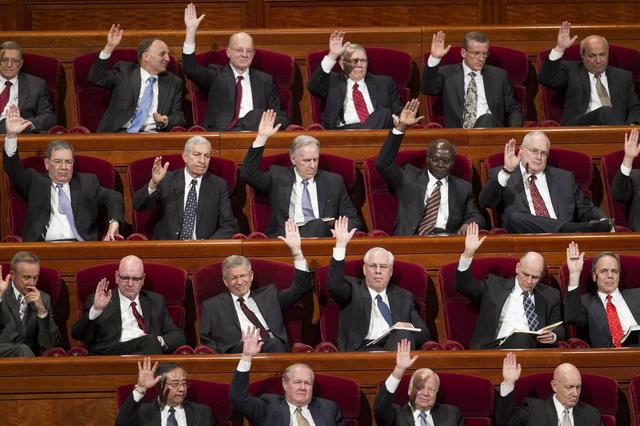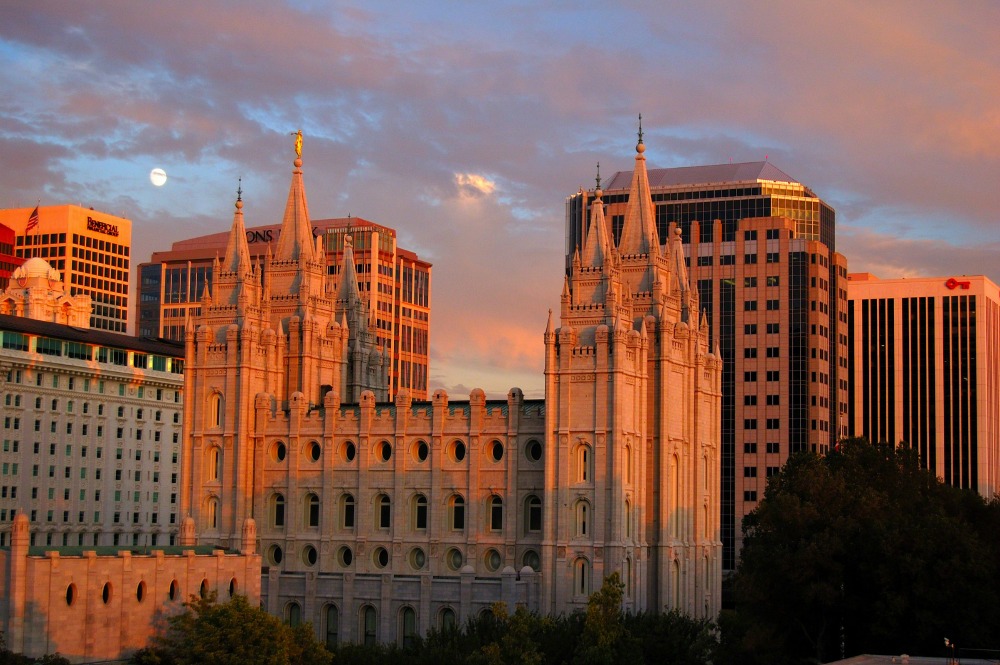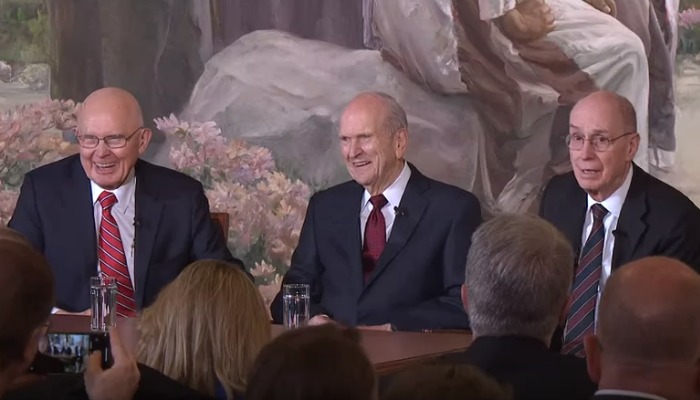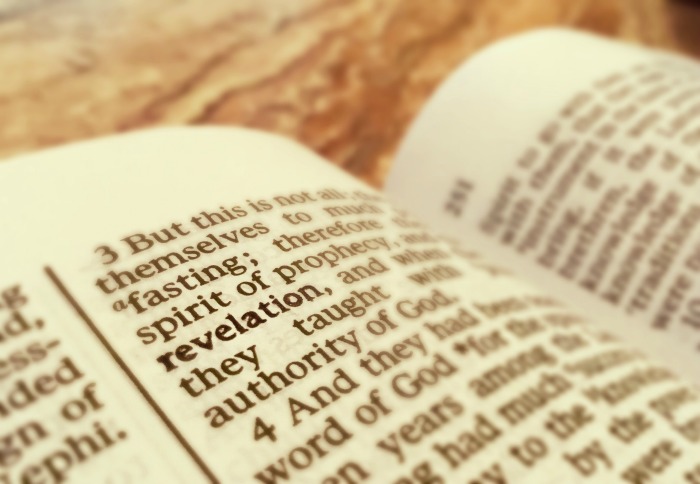Our Leaders Are Mostly White and American, Here’s Why That Doesn’t Bother Me
Opinion
I fully recognize that I’m probably putting myself on the chopping block for writing on such a controversial topic (especially as a white American) but I truly believe the principles surrounding this issue are important to digest, so here goes.
The new First Presidency of The Church of Jesus Christ of Latter-day Saints faced some tough questions during January 16th’s press conference. One question in particular stuck out to me and I’d like to address is directly. The question, from The Salt Lake Tribune’s religion reporter, was:
So under President Monson we saw some real advances towards gender equity—the lowering of the missionary age, especially for sisters, and also adding women to some of the executive committees, but the Church leadership is still white, male, American. What will you do in your presidency to bring women, people of color and international members into decision-making for the Church?
Forgive me, but I’m not going to address the gender equality portion of her question in this article. That’s a story for another day, but I do want to give my take on the race and nationality issue. And frankly, to me it’s more of a question about revelation than it is about race, but we’ll get to that.
Why are there so many white, American general authorities?

It’s a concern/complaint I’ve seen expressed more than once. The Twittersphere had plenty to say about it back in October 2015 when three new (white) apostles were called.
The SLTrib is raising their eyebrows this time and surely the issue will arise again if the late Elder Hales is replaced by a white man.
President Nelson responded to the SLTrib’s question, saying (in part) that “the Twelve and the Seventy are not a representative assembly of any kind,” but that “we’ll live to see the day when there will be other flavors in the mix.”
President Oaks added that “the most important thing about us is that we are all children of God. If we keep that in mind we are better suited to relate to one another and to avoid a kind of quota system, as if God applied his blessings and extended his goodness and his love on the basis of quotas that I think He does not recognize, so we shouldn’t.”
The underlying problem with the question

When the world questions the race/nationality of the Church’s leaders there always seems to be the underlying accusation/assumption/suspicion that the Mormon God is either racist, or that our leaders are simply lying about these white-washed “revelations” from God.
And frankly, I can understand that perspective. If you’re not familiar with our doctrine, practices, and beliefs it would be easy to get caught up in the political correctness of our leadership.
We claim that our leaders make callings by divine revelation, but what is “divine revelation?” I fear many people (even some members) think this means that President Nelson wakes up in the morning with the name, location, and short biography of a complete stranger that he is to call to the Quorum. I dare not limit the Spirit and claim that this kind of revelation is impossible, but I’m confident that it’s much more rare than common.
Behold, you have not understood; you have supposed that I would give it unto you, when you took no thought save it was to ask me.
But, behold, I say unto you, that you must study it out in your mind; then you must ask me if it be right, and if it is right I will cause that your bosom shall burn within you; therefore, you shall feel that it is right
Complaints regarding diversity amongst leadership represent a misunderstanding of revelation
I’m going to digress for a moment, but I’ve got a point to make.
Back when I started college, like many kids, I had almost no idea about what I wanted to study. As I struggled to figure it out, my father would frequently remind me to “just make sure the Lord approves of your decision.”
The same advice came when I faced the ever-intimidating marriage decision: Study it out in your heart and mind, make a decision, and bring that decision to Heavenly Father for confirmation.
I suspect most bishops will agree that when they extend callings to the members of their ward they meet with their counselors, prayerfully talk about individuals they think would fit well in the calling, and then, if they feel at peace with the decision, they give that member a call.
I believe Heavenly Father rejoices over this process. It allows His children to use their divinely given gift of agency. It encourages us to act and not simply be acted upon. And I believe our prophet and Quorum of the Twelve Apostles use this same process to fill vacancies in their quorums and presidencies.
Surely the Spirit guides them throughout the process, just as the Spirit guided the faith-filled Nephi through the darkened streets of Jerusalem on his quest for the brass plates. While justifiably called divine revelation, I appreciate Elder Richard G. Scott’s definition of divine inspiration, which may be an even more appropriate term.
What leadership has said about their selection process
We don’t know every detail about their process, but what we do know leaves room for the revelatory steps we’ve been addressing. Here’s what Elder Christofferson said back in 2015:
[President Monson’s] practice has been to ask each of his counselors and the members of the Quorum of the Twelve to give him names they would recommend for his consideration, not to discuss with each other but just individually, to give him whatever name or names they feel impressed he ought to look at.
What process he goes through exactly, I’m not sure. That’s, again, something private he pursues. He then brings back, when he’s reached his decision and had the inspiration he needs, the name or names to the council that we have of the First Presidency and the Quorum of the Twelve Apostles to sustain it. That goes forward to general conference.
Back in 1994, President Gordon B. Hinckley gave us some valuable insight as well:
In filling that vacancy [left by Elder Marvin J. Ashton], each member of the First Presidency and the Quorum of the Twelve was at liberty to make suggestions. I am confident that in every case, there was solemn and earnest prayer. A choice was then made by the First Presidency, again after solemn and serious prayer. This choice was sustained by the Council of the Twelve. Today, the membership of the Church in conference assembled has sustained that choice.
I give you my testimony, my brethren, that the impression to call Brother Hales to this high and sacred office came by the Holy Spirit, by the spirit of prophecy and revelation. Brother Hales did not suggest his own name. His name was suggested by the Spirit.
What does that imply?
 This revelatory process implies that for a calling to the Quorum of the Twelve our leaders are probably going to suggest names of people they know well and deeply trust to be up to the task. After all, they’re going to be working together until they die. It’s no surprise that most are from the United States of America, and are white (see stat below).
This revelatory process implies that for a calling to the Quorum of the Twelve our leaders are probably going to suggest names of people they know well and deeply trust to be up to the task. After all, they’re going to be working together until they die. It’s no surprise that most are from the United States of America, and are white (see stat below).
Church headquarters is in the United States. Mormonism’s roots run deep here. Most past and current leaders grew up here. It makes total sense to me that many of the names they might propose for Quorum vacancies come from here as well, where, according to Pew Research Center, almost 90 percent of Mormons happen to be white.
If Church headquarters were to suddenly relocate to Ghana, Africa, I’m positive we’d see more and more Africans in leadership positions as the current leaders got to know them more.
Another implication of this kind of revelation is that there may not be just one right answer to the question, “Whom should we call?” I studied journalism in school, but if I had wanted to study biology instead, or philosophy, I’m confident I would have felt God’s approval. … Well, maybe not philosophy.
If our leaders were to call Elder Donald Hallstrom, another white American, to fill the current vacancy in the Twelve, would that mean that no one else on the planet could have been chosen instead? I don’t think so. One man’s calling should by no means be interpreted as a declaration of unworthiness on everyone else, white or not.
Though Elder Hallstrom would be called of God, hold all the proper keys and would offer his specific talents to the mix, I’m sure Elder Soares would do an exemplary job as well. There’s often more than one right answer.
A worldwide church

Yes, The Church of Jesus Christ of Latter-day Saints is a worldwide church. And yeah, it’d be sweet to have more leaders from different parts of the world. It’d add different cultural perspective and allow international members to relate to leadership in a unique way, which would be great!
I think their recent selections have everything to do with revelation, and nothing to do with racism. The thought of trying to pressure them into more diverse choices for the sake of political correctness doesn’t sit well with me. The thought of pressuring them into anything doesn’t sit well with me.
So, no, I’m not going to tweet out my disapproval of their decisions. I’m not going to dismiss their counsel because they’re white and get the Senior discount at Applebees. My testimony of their divine appointment remains unshaken.



